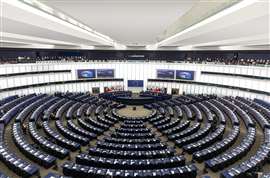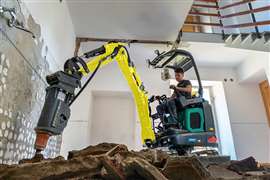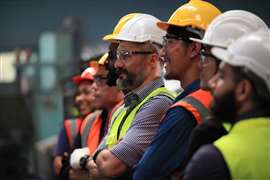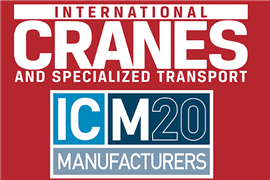Read this article in 中文 Français Deutsch Italiano Português Español
What the construction industry wants from the European elections
11 April 2024
 The European Parliament in Strasbourg, France (Image: misu via AdobeStock - stock.adobe.com)
The European Parliament in Strasbourg, France (Image: misu via AdobeStock - stock.adobe.com)
Elections for the European Parliament are approaching rapidly, with votes set to go to the polls on 6-9 June this year.
The outcome will help to shape Europe’s politics for the next five years, which is why two major bodies representing the interests of the European construction industry and construction equipment manufacturers are both making their case now to shape future policy.
Both the European Construction Industry Federation (FIEC) and Committee for European Construction Equipment (CECE) have released their manifestos, not only setting out the importance of their members to Europe and its economy but also listing what they want to see Europe’s leaders do to support their industries.
Both lay claim to considerable clout. FIEC represents 32 national construction federations in 27 countries and estimates that combined they make a 10.1% contribution to EU gross domestic product (GDP). Meanwhile, CECE claims its members manufacture 20% of the global output of construction equipment.
Common themes
So what do they want from the next European government? Both have set out a list of areas where they would like to see more action or support (see more below). But there are some common themes that cut across both.
The elections come at a time when governments around the world, including in Europe, are trying to lead a significant reduction in CO2 emissions to meet the target of reaching net zero by 2050.
That requires significant investment in new infrastructure, as well as work to make existing infrastructure assets more resilient to the climate change that is already taking place.
While both FIEC and CECE see this as an opportunity for construction to take a leading role, they also both warn that they want to see measures to support construction in assisting Europe in achieving its goals, rather than tying it up in new regulations.
Pointing out that manufacturers have already adopted heavily in clean technology to reduce emissions that pave the way for decarbonised construction in Europe, CECE says, “Technology-neutral policies and enabling factors are fundamental to make sure that construction machinery can deliver the Green Deal.”
 FIEC president Philip Crampton. Photo: FIEC
FIEC president Philip Crampton. Photo: FIEC
Philip Crampton, president of FIEC, adds, “We need to implement and update regulation, standardisation and certification – we accept that. But on the other hand, let’s make sure it supports competitiveness and innovation, rather than jeopardising common efforts.”
Both have also called on the next crop of MEPs to do more to make European construction more competitive. FIEC, alongside European International Contractors (EIC) noted that public procurement procedures both inside and outside of Europe have made it harder for European international contractors to compete, resulting in a loss of market share.
And CECE has also expressed concern about the ‘unfair’ commercial practices of its global competitors – an issue that came to the fore last year when the UK launched an investigation into the alleged ‘dumping’ of Chinese excavators in the UK market, at around the same time the European Commission launched an investigation into imported mobile elevated work platforms (MEWPs) from China amid complaints from European suppliers.
Commenting specifically on the situation facing contractors, “EIC calls upon EU policy makers to use their legislative powers in trade, development and neighbourhood policies to establish a level playing field for European international contractors working outside the EU.” Benoît Chauvin, EIC president.
CECE’s 4 key messages
In its manifesto, CECE said construction holds the potential to turn Europe’s Green Deal into a growth strategy, with construction equipment manufacturers as enablers of the green transition. To do so, it set out its key messages in four areas:
1) Single Market: CECE said that Europe’s Single Market, which allows the free movement of people, goods and services across national borders, needs continued dedication to make sure it is protected and strengthened. It called on the incoming European legislature to: reduce the regulatory burden on European companies; apply the market surveillance framework, amid concerns that current practices aren’t addressing product compliance; facilitate compliance with the Machinery Regulation through a comprehensive and timely guide to application for manufacturers; ensure supply chain resilience through further Single Market integration; uphold the role of harmonised standards in the New Legislative Framework by ensuring their swift publication in the Official Journal of the EU; and refraining from creating technical specifications which circumvent the European standardisation system.
 Ammann’s eAMX15 electric excavator will be on show at Intermat. (Photo: Ammann)
Ammann’s eAMX15 electric excavator will be on show at Intermat. (Photo: Ammann)
2) Path to Decarbonisation: On decarbonisation, CECE emphasised that there needed to be a transition from a solely machine-focused approach to a more holistic view. But it also warned that construction machinery needs sector-specific solutions that can’t just mirror the on-road sector. It called on the legislature to: Synchronise decarbonisation policies with other regions of the world; uphold the principle of technological neutrality; foster the availability of low or net-zero CO2 energy carriers at acceptable costs; Facilitate the large-scale deployment of low and net-zero refuelling infrastructure; Incentivise fleet renewal and upscale the adoption of net-zero machines through European Investment Bank loans; Develop an EU-wide framework for public procurement that supports sustainable European solutions for public tenders; Include synthetic fuels in the definition of CO2-neutral fuels.
3) Digital transition and data: CECE urged policy-markers to remember that digitalisaiton is not a goal in itself but an enabler of the construction industry. It called for the legislature to: Support for manufacturers for consistent implementation of Cyber Resilience Act and Data Act; Deliver harmonised standards and effective guidance for implementation of the Critical Raw Materials Act (CRA); Ensure implementation of the Data Act does not hinder B2B contractual freedom and protection of trade secrets; ensure proper implementation of the AI Act; Tackle digital skills gap in areas such as AI and cyber security by funding training programmes.
4) Global competitiveness: CECE stressed the importance of maintaining the competitiveness of Europe’s construction equipment industry on a global scale and it called for: A conclusion to negotiation of the EU-Mercosur free-trade agreement (with Argentina, Brazil, Uruguay and Paraguay); Finalising of the EU-India free-trade agreement; Enforcement of the EU Customs Union with Turkey; Relevant investigations into unfair commercial practices of EU’s global competitors; A reaffirmed commitment to the reconstruction of Ukraine; Permanent agreement on EU-US tariffs on steel and aluminium. Sustainable mining support across EU. Full implementation of the Critical Raw Materials Act.
To read CECE’s manifesto in full, click here.
FIEC’s 10 key messages
FIEC itself set out 10 key messages to European policy-makers from the European construction industry. Here’s a summary of each of the 10 points:
1) Ensuring an adequate framework for public procurement: FIEC argued that Europe’s current legal framework does not adequately address unfair competition by third country companies in public procurement, especially those bidding at prices that appear to be abnormally low. It called for measures to restrict EU member states from undertaking in-house procurement and harmonised methods for identifying abnormally low tenders. It also called for measures to avoid the practice of imposing the use of particular BIM software on bidders.
2) Price adjustment mechanisms: It called on the European Commission to issue guidance aimed at encouraging member states to consider price revision mechanisms that take into account complexity of construction projects. The call comes after contractors in fixed price contracts were burned by supply chain problems and inflation, sending some bankrupt.
3) Investing in infrastructure: With pressure on European energy network to deliver far more renewable energy, along with a transport network that FIEC said is “far from complete and deteriorating”, it argued that investment in infrastructure projects should be a key priority at national and EU level.
4) Construction at core of transition to sustainable society: FIEC said that a series of plans to boost sustainability in Europe, including the Circular Economy Action Plan, Renovation Wave, Fit for 55 and other initiatives represent a business opportunity for construction sector. But it called for balance between the green agenda for and flexibility for industry, with enough time for companies to become more circular, adopt low-carbon construction materials, and low-emission fuels, and embrace new whole life cycle approaches, along with adequate financial support to cope with the “enormous efforts” involved in decarbonising the entire construction value chain.
5) Adequate implementation of EU taxonomy for sustainable activities: The EU taxonomy for sustainable activities a key reference for investors and companies, designed to direct investment to projects most needed for the transition to climate neutrality. FIEC’s manifesto said that it was essential to enable construction companies to comply with EU taxonomy’s technical criteria, which involves making sure that new or revised criteria must be implementable by construction companies. It also called on the European Commission to ensure that smaller companies that do not comply with ambitious technical criteria will have alternative solutions and aren’t cut off from investments.
 Image: Sittinan via AdobeStock - stock.adobe.com
Image: Sittinan via AdobeStock - stock.adobe.com
6) Tackle labour shortage and skills gap: Construction companies are still struggling to find workers with skills, a problem that has become more pressing with the green and digital transition and an ageing population. FIEC urged the EU to increase investment in learning as well as apprenticeship schemes and schemes promoting the attractiveness of the construction sector. Meanwhile, it asked policy-makers to consider ways of allowing the safe access of skilled third-country nationals to the EU.
7) Build climate-resilient cities of tomorrow: FIEC called on the European Commissionto accompany member states, regions and cities in defining the medium- and long-term objectives for urban areas, striking the right balance between the urgency of climate protection and socio-economic needs such as affordable and social housing and mobility.
8) Ensure fair working conditions: On backdrop of mandate of European Labour Authority (ELA), FIEC said the EU should continue to fight against fraudulent practices in construction and improve access to and the quality of national and EU legislative information.
9) Strengthen a culture of prevention for healthy and safe working: FIEC said it backed the ‘Vision Zero’ scheme promoted by the European Commission in the field of occupational safety and health. But it warned that when adapting or elaborating occupational health and safety legislation, the EU must take into account specific sectoral circumstances and needs, including period of adaptation for companies. It called for the existing health and safety legislative framework across Europe to be made simpler and more easily enforceable without lowering protection for workers and companies.
10) Build a level playing field for European international contractors: Over the past decade, European construction has experienced “continuously increasing unfair competition” in public procurement procedures inside and outside the EU internal market from third-country state-owned enterprises, according to FIEC and EIC. While there have been some steps to level the playing field, they urged the new European Commission and European Parliament to continue in this direction and suggested that the reconstruction of Ukraine would be an ideal opportunity to introduce a ‘Buy European’ policy.
Read FIEC’s manifesto in full here.
Electing a European Parliament and European Commission President
Elections across the continent of Europe will see 720 Members of the European Parliament (MEPs) selected in June this year. It will be the tenth parliamentary election since the first direct elections in 1979.
Once the MEPs have been selected, they will approve a new European Commission is approved by those MEPs.
They will also elect a new President of the European Commission, selected from candidates nominated by the European Council (made up of the heads of state or government of all EU countries, the European Council President, and the European Commission President). The new president will have a five-year term.
STAY CONNECTED


Receive the information you need when you need it through our world-leading magazines, newsletters and daily briefings.
CONNECT WITH THE TEAM











